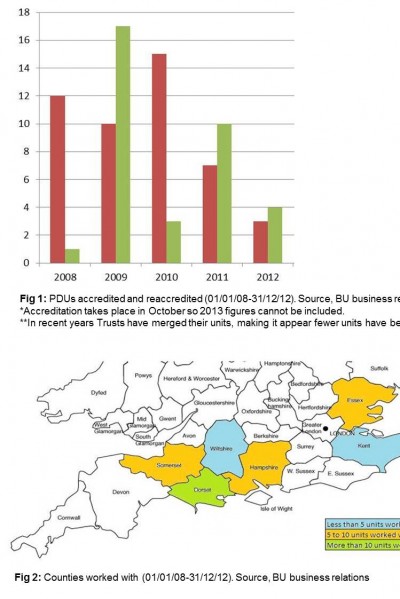BU researchers Warr, McSherry, Graham and Keen, developed practice development approaches that would work across a wide variety of health and social care settings, including NHS Trusts, social services departments and other organisations.
The research group identified a need for teams to question and challenge current practice and, by using evidence, improve services.
The following research themes emerged, which form the basis of the standards of the Practice Development Units (PDUs) BU went on to establish:
- Practice development is intended to improve person-focused care
- Practice development should be practitioner owned and should empower practitioners to instigate change
- To be effective, practice development needs to bring about cultural change
- Practice development improves practice through the systematic introduction of evidence-based care.
From this they established an explicit set of standards to measure the quality of units against, allowing successful departments to gain PDU accreditation or status.
Teams work towards developing a culture of excellence by becoming person-centred and introducing evidence-based practice through effective culture change and teamwork. Teams are encouraged to question and challenge current practice and, by using evidence, improve services.
At the time of the case study’s publication:
Each PDU must demonstrate:
- An understanding of the service user needs and clear mechanisms for communicating and listening to users and carers
- How developments are researched, evidence-based, evaluated and disseminated to demonstrate best practice and to contribute to the local, national and international evidence base
- A clear action plan that outlines the aims for development of services and team members with links to national and local host organisation priorities
- A leadership structure that supports the delivery and development of multi-agency inter professional care in line with the action plan
- A defined communication structure to ensure the collaboration of team members and the provision of effective inter professional care
- A clear understanding of the user`s journey and understanding of the team member’s contribution to the success of the user experience
- How services have been developed taking a ‘whole systems’ approach, ensuring the entire user journey is improved
- Clear partnerships with an academic department and other agencies required to support research and the dissemination of best practice.
Since 2008 BU researchers have facilitated the set-up and accreditation of 47 PDUs and reaccreditation of 35, working with 82 units in total. This covers 6 counties in the UK, including 8 NHS Trusts serving a resident population of over 3.5 million. Units accredited and reaccredited include social services departments, dementia services and children’s units.
Reported benefits of practice development include a reduction in pain through pain management pathways, improvements to cleanliness, more patient-friendly visiting times and protection of patient privacy and dignity. Benefits on practice include better communication between staff and carers, a reduction in ‘inappropriate admissions’, more effective team organisation and increased funding from service commissioners.
